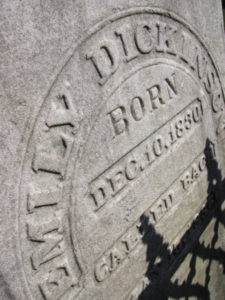< Return to Emily Dickinson Poems
Because I Could Not Stop For Death
Because I could not stop for Death-
He kindly stopped for me-
The Carriage held but just Ourselves-
And Immortality.
We slowly drove- He knew no haste
And I had put away
My labor and my leisure too,
For His Civility-
We passed the School, where Children strove
At Recess- in the Ring-
We passed the Fields of Gazing Grain-
We passed the Setting Sun-
Or rather- He passed us-
The Dews drew quivering and chill-
For only Gossamer, my Gown-
My Tippet- only Tulle-
We paused before a House that seemed
A Swelling of the Ground-
The Roof was scarcely visible-
The Cornice- in the Ground-
Since then- ’tis Centuries- and yet
Feels shorter than the Day
I first surmised the Horses’ Heads
Were toward Eternity-
-Emily Dickinson
Enjoy Artistic Representations of “Because I Could Not Stop For Death” by Emily Dickinson

Death as a skeleton carrying a scythe. Illustration of La Fontaine’s fable “La Mort et le Mourant”, 1678.

Main illustration for the short story “The Man Who Lived.” Internal Illustration from the pulp magazine Weird Tales (September 1941, vol. 36, no. 1).
Listen to these Readings of “Because I Could Not Stop For Death”
Listen to these Musical Interpretations of “Because I Could Not Stop For Death” by Emily Dickinson
About Emily Dickinson

Emily Dickinson estate in Amherst Massachusetts
Emily Dickinson was born in Amherst, MA, in 1830, the daughter of state and federal politician Edward Dickinson. A prolific poet, Dickinson was known to draft poems on the backs of envelopes and chocolate wrappers. Nearly 1800 of her poems were discovered by her family following her death, many in 40 handbound volumes she had sewn together, written in her own hand with her famously unorthodox punctuation.

Emily Dickinson & Susan Gilbert
The enigmatic poet is remembered as a recluse, rarely leaving the Dickinson estate. While she did receive callers at her home, conversations were often held from opposite sides of a closed door.
She lived with her sister, Lavinia, while her brother Austin and his wife, Susan Gilbert, lived down a narrow path on the property. Her writing reflects profound loneliness as well as a deep capacity for love and affection, much of which is believed to have been shared with Gilbert.
Her first collection of poems, Poems by Emily Dickinson, was published four years after her death, with Poems: Second Series and Poems: Third Series following in the next several years.

“Called Back”
Like Walt Whitman (who she reportedly never read), she is considered one of the most influential poets in the emergence of a distinctly American poetic voice.
She was born on December 10, 1830, and today visitors to Emily Dickinson’s grave can witness a lasting image of her perspective on life. The etching on her stone marking the date of her death—May 15, 1886—bears the words “Called Back.”
< Return to Emily Dickinson Poems
